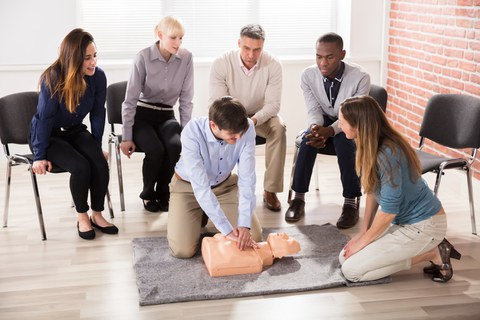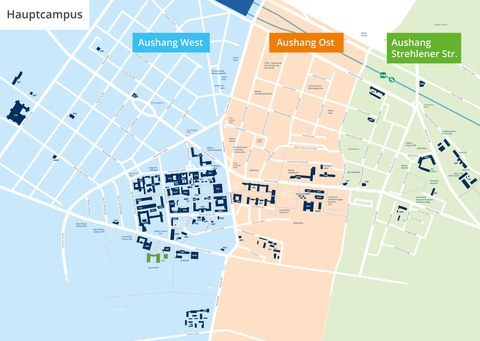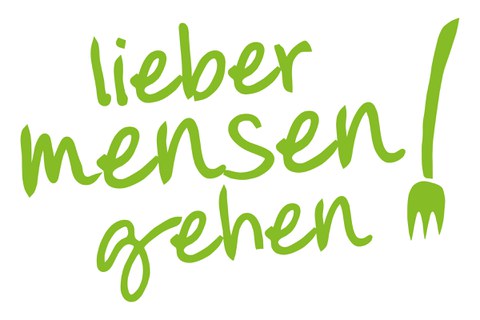Physical health

© PantherMedia / Andriy Popov

© Sven Ellger

© PantherMedia / Wavebreakmedia ltd
Table of contents
Get moving!
Sports courses
Dresden University Sports Center (DHSZ) offers a wide range of in-person and online sports courses for all TUD members. From fitness to mindfulness and dance to team sports – there’s something for everyone.
Want to join a sports group and still looking for like-minded people? Visit the DHSZ sports partner exchange to enter your request or get in touch with others.
Active break
Long periods of sitting and working with a computer are often the norm in everyday working and student life. To relax from time to time, to do something physically good for yourself and maybe even to prevent aches and pains, the DHSZ offers active breaks Bewegte Pause Give yourself 30 minutes and start again feeling refreshed.
Do you work remotely or are you unable to participate in on-site active breaks? Then feel free to try out this active break training video.
Highway-TU-Health
Located in the heart of the main campus, the Highway-TU-Health offers an easy way to get moving in between classes without much effort. It comprises four types of sports equipment which can be used to improve strength and balance.
The Highway-TU-Health is located in the middle of the TUD campus.
First aid
Acute illnesses or accidents can occur anywhere at any time – even in TUD’s study and work spaces. Occupational Health Services and dedicated staff and students offer first aid services for everyone to help them stay healthy during their everyday studies and work.
Workplace Regulation ASR A4.3 stipulates the requirements for first aid equipment and facilities as well as first aid rooms in the workplace.
First aid items must be kept in first aid kits or other suitable containers (such as cupboards).
Table 1 shows the minimum number of required first kits. Table 2 shows what the first aid kits should contain.
First aid kits must either be within 100m of fixed workplaces or located no more than one storey away. They must be stored wherever working conditions require them. You can find pictures of suitable first aid kits in Table 1. Please refer to the order form for prices.
- Table 1: Minimum number of required first aid kits
- Table 2: First aid kit contents
Labeling first aid kit locations
First aid kit locations must be readily visible and easy to recognize, so that everyone can find them quickly.
The standardized symbol for indicating a first aid kit location is a white cross on a green background (as defined by DIN EN ISO 7010 E003; ASR A1.3 E003).
You can always order the stickers from us.
Documenting first aid activities
As a result of the data protection laws, the first aid book was replaced by a record form (in the form of a paper notepad). Alternatively, you can fill out the form on your computer: Documentation of first aid provided and / or accidents. You must either use the notepad or the digital form to document first aid activities.
Individual documents as well as current first aid books must be kept under lock and key for at least 5 years either by the supervisor or an individual delegated by the superior.
In the case of accidents where medical consultation was not needed, simply fill out the notepad or the digital form. If the accident resulted in a doctor’s visit, you must send an accident report to Unit 4.6 (there is a different procedure for civil servants).
Visit the Safety at Work web pages for more information
To order paper record forms, please use our order form.
Occupational Health Services are happy to assist you in procuring first aid materials (first aid boxes, posters, stickers etc.).
Each department is responsible for checking the first aid kits and re-filling them regularly.
You may refer to the following documents as a guide:
- Table 1: Minimum number of required first aid kits (incl. technical data on the containers)
- Table 2: First aid kit contents
- Table 3: The contents of fist aid bags
Notes
- Each order of first aid kits or bags must be discussed by phone (to determine who bears the costs – Occupational Health Services or the orderer)
- First aid kits must either be within 100m of fixed workplaces or located no more than one storey away. They must be stored wherever working conditions require them.
- The first aid kits should be hung up for everyone to see (not behind locked doors)
- For fire safety reasons, cupboards hung in the hallway must be made of sheet steel (NovoLine 1 or 2)
- First aid kits in rooms can be made of plastic or sheet plastic (Quick, Novoline 1 or 2)
- Please select your container type with its location in mind as well as the minimum number of required first aid kits
- Whenever an order is placed for a first aid kit, we will call the person placing the order and advise them:
This will determine whether a crate is recommended and who will bear the costs - Due to cost-saving measures, we pool orders and send orders for replacement items at the end of the month. If your order is urgent, please make a note of this on the order form.
Please remember to also fill out the top of the form completely, noting that you should collect first aid kits at the Occupational Health Services office.
You can send the completed from to us via fax (+49 351 463-33993) or in-house mail.
We cannot place external orders at the end of the year (this applies to first aid boxes and cupboards in particular). We place the last external order of the year in mid-November.
Anyone can become a First Aid Officer. To do so, you must be prepared to refresh and consolidate your knowledge of first aid on a regular basis.
You should aim for a long-term First Aid Officer appointment as this will enable you to gain confidence and practical experience in first aid work. If you would like to get involved in first aid at TU Dresden, please contact your supervisor.
- 10% of on-site employees must be First Aid Officers
- First Aid Officers must complete a training course (9 teaching units)
- Refresher course every 2 years – (advanced training course with 9 teaching units)
More information
- First aid flyer
- The Saxon Accident Insurance Fund (Unfallkasse Sachsen) SiBe Report (in German only)
Documents for supervisors
To register new First Aid Officers, please fill out the Registration / De-registration form. Please send this to Occupational Health Services. Current First Aid Officers can also register on the phone.
Please send the original document to the First Aid Officer and keep a duplicate for documentation purposes.
First aid courses
The courses take place over one day (9 teaching units, 8.00 Uhr-16.00 Uhr). The course is free for all TUD employees.
Course location
Malteser Hilfsdienst e.V.
Leipziger Straße 33
01097 Dresden
(Hygiene concept)
Important note:
Please remember to bring a packed lunch and snacks with you.
Admission requirements (as of January 2023)
Health & safety measures:
- Wash your hands regularly and thoroughly.
- Avoid coughing on others and do not shake hands.
- Please use a tissue when you cough or sneeze. If you do not have a tissue, sneeze into your elbow.
First aid courses in English
| Date | Comments |
|---|---|
| 19.04.2024 | fully booked |
Courses in English
We had a very low number of participants for English courses in the past years and therefore ask that you contact us via email if you are interested in a first aid course in English.
We will make a waiting list and organize a course when we have a sufficient number of participants.
2025 training courses
| Date | Comments |
|---|---|
| 21.01.2025 | fully booked |
| 13.03.2025 | 1 available |
| 07.04.2025 | 1 available |
| 14.05.2025 | 1 available |
| 19.06.2025 | fully booked |
| 25.08.2025 | 2 available |
| 23.09.2025 | available |
2025 advanced training courses
| Date | Comments |
|---|---|
| 23.01.2025 | fully booked |
| 28.01.2025 | fully booked |
| 10.02.2025 | fully booked |
| 12.03.2025 | fully booked |
| 20.03.2025 | 2 available |
| 25.03.2025 | fully booked |
| 03.04.2025 | 1 available |
| 14.04.2025 | 1 available |
| 06.05.2025 | fully booked |
| 15.05.2025 | fully booked |
| 26.05.2025 | fully booked |
| 03.06.2025 | fully booked |
| 12.06.2025 | fully booked |
| 18.06.2025 | fully booked |
| 21.08.2025 | fully booked |
| 08.09.2025 | fully booked |
| 17.09.2025 | 1 available |
| 30.09.2025 | available |
| 03.11.2025 | fully booked |
| 3.11.2025 | available |
Registration
To register for a course, please contact Ms. Finger (Unit 9.4 Occupational Health Services).
For registered First Aid Officers
Please let us know:
- That you are registering for an advanced course
- And inform us of your preferred date
For prospective First Aid Officers:
Please let us know:
- That you are registering for a training course
- And inform us of your preferred date
- Please also provide the following for new First Aid Officers: Name, telephone, email address, Institute / office
Cancellations
If you have a valid reason (such as illness) for being unable to attend the course, please contact us as soon as possible via telephone (463 36199) or email (
Otherwise, your place of work must cover the costs.
Unit 9.4 – Occupational Health Services of TU Dresden has supplied the following resources for the main campus:
- First aid poster (in German and English – new in 2020)
- Emergency number poster with emergency numbers (in German and English – new in since 2020)
These A3 posters must be displayed in all buildings.
You can order them from Occupational Health Services using the order form.
Please also display the emergency number poster with the list of emergency numbers relevant to your location. The campus has been divided into areas for this purpose, with Bergstraße/ Fritz-Löffler-Straße representing the border in the main campus area.
Attention: Please make your own additions (see below)!
Emergency numbers for the emergency poster
(updated April 2024)
- Campus East
- For buildings with a defibrillator --> emergency numbers for Campus East
- For buildings with a defibrillator in another building --> emergency numbers for Campus East
- Campus West
- For buildings with a defibrillator --> emergency numbers for Campus West
- For buildings with a defibrillator in another building --> emergency numbers for Campus West
- Strehlener Platz
- For buildings with a defibrillator --> emergency numbers for Strehlener Platz
- For buildings with a defibrillator in another building --> emergency numbers for Strehlener Platz
- Johannstadt
- For buildings with a defibrillator --> emergency numbers for Johannstadt
- For buildings with a defibrillator in another building --> emergency numbers Campus for Johannstadt
- Botanical Garden
- For buildings with a defibrillator --> emergency numbers for the Botanical Garden
- For buildings with a defibrillator in another building --> emergency numbers for the Botanical Garden
For Pirna and the surrounding area
- For buildings with a defibrillator --> emergency numbers for Pirna
- For buildings with a defibrillator in another building --> emergency numbers for Pirna
For Tharandt and the surrounding area
- For buildings with a defibrillator --> emergency numbers for Tharandt
- For buildings with a defibrillator in another building --> emergency numbers for Tharandt
For Zittau and the surrounding area
- For buildings with a defibrillator --> emergency numbers for Zittau
- For buildings with a defibrillator in another building --> emergency numbers for Zittau
Blank version
If your building is far from the above areas.
- for building with a defibrillator --> emergency numbers to enter by yourself
- for building with a defibrillator in another building --> emergency numbers to enter by yourself
For radiation accidents
-
First aid for radiation accidents
We would like to point out that you are free to visit a doctor of your choosing, regardless of these lists!
Please include the following information on the posters with your building in mind:
- At the top: the address and the building abbreviation
- on the side: location of first aid material (first aid kit) and nearest defibrillator
- centre: nearest general practitioner from your location
- at the bottom: First aider
The topicality of the posters is regularly checked by us.
Please put the current Poster in the foil pocket with the emergency poster (remember to update it regularly).
If you have called the emergency services, please also inform TU Dresden security service immediately on ext. 20000 (Falkenbrunnen: ext. 34515).
Medical treatment after work-related accidents
For initial medical care after an accident at work, a doctor can be chosen of the employee’s own volition, e.g. a Durchgangsarzt (a surgeon or orthopedic surgeon who specializes in treatment following work-related accidents and has special accreditation from statutory accident insurers) or the next available doctor in the appropriate specialist field (e.g. GP, optician, dermatologist, ENT doctor).
You must visit a Durchgangsarzt if the first doctor you visit concludes that your injury will lead to an inability to work beyond the day of the accident or that the necessary medical treatment will likely last for more than a week (Regulation 1 of the German Social Accident Insurance – DGUV, § 24 (4)). You can find a Durchgangsarzt in your vicinity here:
D-Arzt-Verzeichnis (only in german)
Employees are free to pick any Durchgangsarzt e.g. you may want to select a doctor in proximity to your place of residence.
If you have an isolated injury to your eye, or your ear, nose or throat area, you must consult the nearest doctor who specializes in these ares, unless your initial treatment had made such a visit unnecessary. An appointment with a Durchgangsarzt is not necessary for injuries of this type.
Address of the responsible accident insurance provider
Unfallkasse Sachsen
Gesetzliche Unfallversicherung
Postfach 42
01651 Meißen
Tel.: +49 (0) 3521 724-0
Fax: +49 (0) 3521 724-111
Website: https://www.uksachsen.de/
Notice "Behaviour in case of accidents"
Please display the notice in a clearly visible place in the building areas used by your structural unit in German and English.
As many TU buildings are difficult for emergency services to find despite the correct address being given, important additions have been made to the previous template with regard to directions.
‘Behaviour in case of accidents’ notice - standard version
german and english
Notice ‘Behaviour in case of accidents’ - Falkenbrunnen variant
german and english
TU Dresden Transport Services
If the injured or sick party needs to be taken to a doctor or taken home, TU Dresden’s Transport Services (ext. 33777) provides transportation. The supervisor must request this service and a second person must travel with the injured or sick party to care for them during the journey.
If the Transport Service is unable to provide help (e.g. because no car is available), the supervisor must find another means of transport (such as a private car or taxi). Journeys of this type are classed as business trips.
First aid
In the event of an accident: secure the accident site (e.g. turn off machinery, switch off electricity)
Check – Call – CPR
For information on performing first aid during the pandemic, please click here.
Check the person’s responsiveness and breathing.
Call for help and support from your colleagues or your building’s First Aid Officer. Then call the emergency services by dialing 112 and then call TUD’s Security Services using the extension 20000 or the full number: 0351 463 20000.
You must inform the emergency services of the following:
- Where did the accident happen?
- What happened?
- How many people are in need of help?
- What type of illness or injury do they have?
- Wait for any follow-up questions – let the emergency services end the call.
CPR: If the person is unresponsive and not breathing, start CPR as soon as possible (in the middle of the chest; at least 100x/minute) and ask someone to get a defibrillator for you (locations). Do not stop until the emergency services arrive! Trained helpers should also perform mouth-to-mouth resuscitation (to the ratio of 2x mouth-to-mouth to 30x chest compressions).
How to use the defibrillators
After opening the lid, you will be guided through the process by clear voice instruction from the device.
Bleeding
- Cover the wound with a sterile dressing material (make sure the person is lying down for this)
- In case of heavy bleeding, apply a compression bandage
- In case of heavy bleeding, keep the person warm
Burns
- Cool small burns (<10% of the body’s surface) with running water
- Do not cool severe burns and do not remove clothing
- Cover burns loosely with a sterile dressing
- In the case of severe burns, keep the person warm
Shock (anxious, pale, shaking)
- If the person is responsive, raise their legs
- Keep them warm with a blanket
- If the person is unresponsive, put them in the recovery position
Emergency phone numbers
For quick medical assistance and in the event of a fire
Call the emergency services: Tel. 112
In case of danger to life, assault, violence, threats or accidents
Call the police: Tel.110
In the case of (possible) poisonings
Call the Poison Help Center: Tel. +49 (0) 361 73 07 30
TU Dresden’s Security Service
For opening barries and giving directions to the emergency services: Tel. +49 (0) 351 463 20 000
Outpatient care (Durchgangsarzt)
For initial medical care after an accident at work, a doctor can be chosen of the employee’s own volition, e.g. a Durchgangsarzt (a surgeon or orthopedic surgeon who specializes in treatment following work-related accidents and has special accreditation from statutory accident insurers) or the next available doctor in the appropriate specialist field (e.g. GP, optician, dermatologist, ENT doctor).
You must visit a Durchgangsarzt if the first doctor you visit concludes that your injury will lead to an inability to work beyond the day of the accident or that the necessary medical treatment will likely last for more than a week (Regulation 1 of the German Social Accident Insurance – DGUV, § 24 (4)). You can find a Durchgangsarzt in your vicinity here:
Unfallkasse Sachsen (German Page)
On-call services, accident and emergency departments and counseling services
You will find a list of all on-call services, accident and emergency departments and counseling services in the City of Dresden’s directory.
Documenting first aid activities
As a result of the data protection laws, the first aid book was replaced by a record form (in the form of a paper notepad). Alternatively, you can fill out the form on your computer: Documentation of first aid provided and / or accidents. You must either use the notepad or the digital form to document first aid activities.
Individual documents as well as current first aid books must be kept under lock and key for at least 5 years either by the supervisor or an individual delegated by the superior.
In the case of accidents where medical consultation was not needed, simply fill out the notepad or the digital form. If the accident resulted in a doctor’s visit, you must send an accident report to Unit 4.6 (there is a different procedure for civil servants).
Visit the Safety at Work web pages for more information
To order paper record forms, please use our order form.
Defibrillator (AED) locations
- At TU Dresden and the SLUB
Please follow the link to find out where the defibrillators are located
- In Dresden
You can find an overview of where defibrillators are located in Dresden in this map, provided by the City of Dresden.
The Student Medical Service (Studentische Sanitätsdienst) is a good point of contact for any students or employees interested in first aid, medical and emergency services as well as disaster prevention. They offer medical services for Faculty Student Councils and events for small groups such as tailored first aid courses. They provide training for their member on a regular basis.
- Costs: You simply need to cover the expenses for materials.
- Languages: German and English
Additional information is available on the Student Medical Service website. If you have any requests, you can contact them via email at .
Studying and working remotely
Working remotely plays an important role for students and staff alike. Visit the page "Healthy mobile working" for tips on setting up a safe workplace in your home and on which ergonomic aspects you should keep in mind.
Balanced diet
A healthy and balanced diet improves physical and mental well-being, can reduce the risks of disease, and can also alleviate a variety of ailments. At the same time, a healthy diet can be tailored to your needs and – most importantly – brings joy and tastes delicious! University Health Management provides support in implementing a more healthy lifestyle with varied, informative, and practical services on healthy and balanced diets.
Continuing education on healthy eating
Nowadays, supermarkets are overflowing with a huge selection of products with big health advertising promises. Here it can quickly happen that you get overwhelmed by the mass of offers and come home with a full shopping basket but an empty wallet. So the question arises: does healthy nutrition have to be expensive, or is it possible to eat a healthy and balanced diet even on a small budget?
The lecture is held in German.
Onlinevortrag: Gesunde Ernährung - geht's auch günstig? © move UP GmbH
This offer is made in cooperation with the Techniker Krankenkasse.
Canteens and cafeterias
Studentenwerk Dresden offers a wide range of food in the canteens and cafeterias.
They serve as meeting places for socializing, sharing, and relaxing from work and study. And the walk to canteens and cafeterias means you can get outside and enjoy some fresh air on your break.
For an overview of the canteens and cafeterias at TU Dresden and other universities, please click here.
You can find an up-to-date overview of all Mensa offers in the online menu on the website of the Studentenwerk Dresden. In addition to general information on prices, ingredients, and allergens, a daily photo is always published there for the majority of the offerings.
Using a filter function, you also have the option of highlighting or completely hiding the offers that are not suitable for a vegetarian or vegan diet or offers that contain certain ingredients or allergens in the menu.
Headaches
Headaches are a widespread and long-term health problem. However, preventative measures can reduce and in some cases even prevent them. Find out more about our headache prevention services for students and employees.








